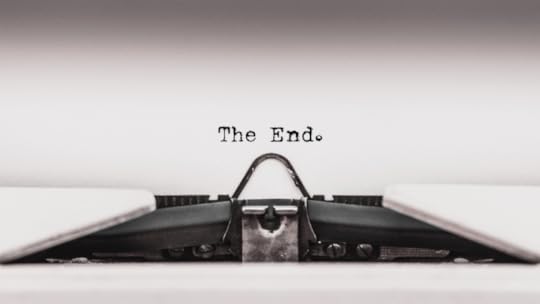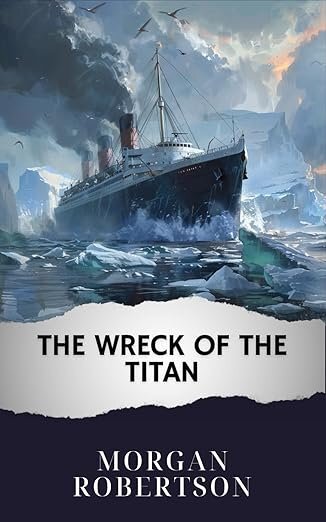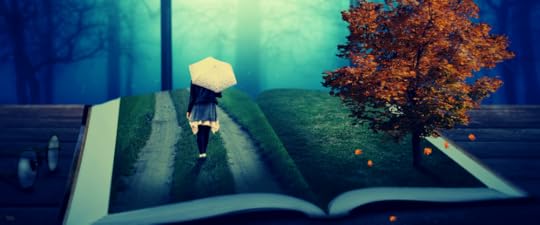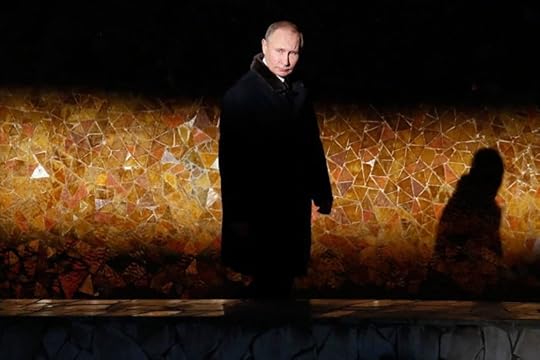E.J. Simon's Blog
June 23, 2025
All’s Well That Ends Well?

Every novel has to come to a close at some point, and novel endings (or movie endings, or TV series endings) come in a variety of flavors: happy, uncertain, sad, intentionally or unintentionally ambiguous, cliffhangers designed to propel you to the next in the series, and so on.
As a reader, I probably prefer happy ones for the dopamine lift and escape they bring, but I also enjoy ambiguous endings that don’t give you full resolution of all the mysteries inside the story but that make you think, reflect, and wonder what happened to the characters after the writer stopped writing.
It’s the uncertain endings, though, that I suspect best reflect real life and real-life endings. All those things we wish we’d done, people we wish we’d stayed in touch with, all those things we wish we’d said instead of just thinking about saying, until one day, for one reason or another, it was just . . . too late.
In reality life is uncertain, so endings are uncertain too. I guess for my friends and readers who enjoy the conviction that comes with religious faith it’s a little different, but the rest of us have to live without knowing what comes at the end. I suspect that makes us crave a bit more certainty in our fictional worlds.
What kind of fictional endings do you like? I’d love to hear from you!
Use the contact page, or email me directly at ejsimon@ejsimon.com
Best,
EJS
March 19, 2025
Fiction Often Tells Us What’s Coming

“In the years before big dramatic events there’s often something in the air, and sometimes the vibrations enter artists’ brains, whether they’re conscious of it or not, and show up in their work.”
- Peggy Noonan, A Certain Idea of America
Here’s something quite mysterious.
The following story doesn’t get much attention these days. It’s too mysterious, or it’s seen as evidence of something beyond our understanding, something in the physical, observable life that that the nonspiritual amongst us can’t explain because it’s something we can’t see.
In 1898, fourteen years before the tragic sinking of the Titanic in 1912, an obscure writer, Morgan Robertson, wrote a novella about a famous ocean liner carrying wealthy, prominent people across the Atlantic that went down after hitting an iceberg.
I just read the book.
The Titanic was 66,000 tons displacement. Robertson’s ship was 70,000.
The Titanic was 882.5 feet long. The fictional one, 800.
Both ships could carry 3,000 people.
Both could go through the water at 24-25 knots.
Both carried only a fraction of the lifeboats they needed.
Both were called “unsinkable.”
Amazingly, Morgan Robertson’s fictional liner was even named Titan.
The novella was originally published in 1898 under the title Futility, then revised and re-released as The Wreck of the Titan in 1912, after the Titanic went down.
Think of this the next time you read a fictional story you’re sure will never become a reality. Death in the Kremlin, for instance . . . ?

January 24, 2025
Books Are Good For You
For readers, it’s probably no surprise that reading books can be good for our mental health and our relationships with others.
Exactly how is becoming clearer, thanks to new research on reading’s effects on the brain. A study published in the Annual Review of Psychology, based on analysis of MRI brain scans, showed that when people read about an experience, they display stimulation within the same neurological regions as when they go through that experience themselves. In other words, we draw on the same brain networks whether we’re reading about hacking our way through the jungle or actually wielding the machete, whether we’re reading about another person’s feelings or trying to guess at them ourselves.
Keith Oatley, professor of cognitive psychology at the University of Toronto, has run a research group on the psychology of fiction. “We show how identification with fictional characters occurs, how literary art can improve social abilities, how it can move us emotionally, and can prompt changes of selfhood,” he wrote in his book, Such Stuff as Dreams: The Psychology of Fiction.
He also said, “Fiction is a kind of simulation, one that runs not on computers but on minds: a simulation of selves in their interactions with others in the social world … based in experience, and involving being able to think of possible futures.”
For many writers and readers, this makes books the best kinds of friends. They give us a chance to rehearse, or play back, interactions with others in the world without doing any lasting damage, or to place ourselves in situations which we would never experience in real life, but without the dangers that may come with those paths in reality.
Reading allows us to live the lives we wish we could, the lives that we will never actually live—and, often for good reason, lives we dare not live.
I’ve found that writing about those experiences does the same thing. I get to be James Bond—or, by creating and controlling my own world, even God-like. And I get to experience the lives of every character, without the real-world repercussions.

December 17, 2024
Armchair Travel via Death in the Kremlin
Feel like getting away from it all this month? Well, reading my latest novel, Death in the Kremlin, will take you to places you may or may not want to visit IRL (that’s “in real life,” if you’re not up on your text/internet abbreviations).
Here’s a quick list: Manhattan, Queens, Long Island. Okay, so far, pretty routine. But there’s also Kure Beach, NC (I know, it’s winter), Washington, DC (heaven forbid), Vegas (always a gamble, haha), Paris and Saint Remy, France (now we’re talking), Berlin (always interesting, lots of ghosts), and, of course, Moscow. Not a bad itinerary for a winter’s day.
I’ve spent time in all of these places except Moscow and, since I’m not big on Russian prisons and I may carry a gummy every once in a while, I think I’ll continue to steer clear. But we can all go there, safely at home—wherever home may be—sitting in a cozy chair with a martini or a glass of wine, near the fire if you have one, through the magic of books.
Happy Holidays!

September 4, 2024
When Your Main Character Suddenly Invades Another Country
What happens when you’re in the middle of your manuscript and the main character brutally invades another country?
I was writing the fictional Putin’s Poison when the nonfictional Vladimir Putin sent his troops into the Ukraine. He was certainly never going to be depicted in my story as a hero—he was already a murderer—but now he was about to become a certified war criminal responsible for mass murders and the unprovoked deaths of hundreds of thousands of innocent people.
First, I became distracted. By his actions, the almost daily reports of his impending downfall, terminal illness, insanity, you name it.
Then I was warned to change the title, that although Putin was not about to ever pick up my novel, it might be read by one of his oligarchs staying at one of the upscale resorts in Europe where my books were provided at the pool or in the rooms. So, I changed the title to Death in the Kremlin. It was less likely to get me eliminated.
Next I became consumed with a depressing and constant stream of new information on this character and what he was doing. There could simply be no way I would attempt to show a softer or even more human side to this man. As a result, I felt I had to change the arc of his character in my book, removing all possibility of redemption.
That’s why the book’s release has been delayed so many times.
But I’m delighted to say that after a complete rewrite and extensive editing, Death in the Kremlin will be released at the end of October, 2024.
I won’t say here what happens to Putin.

July 12, 2024
The Role of Chance in our Lives, or How a Single Moment Can Change Everything
We have differing perceptions or beliefs on why things happen: is it preordained, destined, fate? Is it the will of the Creator or a supreme being? Or is it simply the result of trillions of everyday life’s coincidences and random occurrences?
I’ve always been struck by the simplicity of chance, the accumulation of countless infinite actions and decisions, some of them random decisions or actions, that lead up to an event, whether it’s something positive like a career change, a marriage, or meeting a future life-long friend; or countless tragedies, like assassinations, unnatural deaths, or crippling injuries.
Any number of miniscule decisions or simple occurrences leading up to those great life events—or tragedies—might have changed everything.
So often a single moment or incident leads to a series of infinite occurrences that, by the end, have defined our lives. Here’s a few examples:
Meeting your life partner because of a party you decided to attend at the last minute, or because of a new job, perhaps leading you to a new city and new friends who introduce you.
The friend you meet by chance who changes everything.
A coach who changed your life.
A professor or teacher who took the time to care.
Those who chose not to go to their offices in the Twin Towers on 9/11, or who, at the last minute, decided not to board an airliner, or simply missed the flight, which later crashed.
The tragic automobile accident that never would have occurred if either party had left seconds earlier or later.
A single chance moment or decision can change our lives.
Maybe that chance encounter was reading a book that changed us. I know of several books that have changed me, often books I would never have read if I hadn’t been browsing in a certain place at a certain time.
So, I’m struck by the role that chance and coincidence play in our lives. I don’t mean here to marginalize those of us whose spiritual faith attribute divine intervention to what I may see as coincidence or chance; after all, it’s interesting to contemplate either way, and we won’t know who’s right until . . .

February 23, 2024
One of the most-asked questions of authors is “Where do you get your ideas?”
My answer is “from everywhere”—from my memories, dreams (particularly the bad ones), from movies (the computer HAL in 2001 Space Odyssey) and the theater (imagine Jekyll & Hyde).
Ideas also come while dining in a restaurant, particularly alone—sitting at the same table at the now closed Le Perigord, where Richard Burton & Elizabeth Taylor, and a deposed Richard Nixon, once dined. Or having a glass of champagne at the Bar Hemingway inside the Paris Ritz, liberated by Hemingway himself after the Nazis fled Paris. Imagine having a martini at Pete’s Tavern, where O. Henry sat and wrote. Somehow, these places and their histories stimulate my thinking.
Or . . . was it just the martini?
Traveling is another source of inspiration. Paris seems to unlock my imagination, as it did with so many legendary writers like Hemingway, F. Scott Fitzgerald, and James Joyce. So do Rome and Florence. These are the settings, the locations for my own novels now.
Real life is a powerful source of ideas, often stranger than fiction. Hitchcock said that “drama is life with the dull bits cut out.” Mark Twain’s Huckleberry Finn was based upon the character of a beloved childhood friend of Twain’s, so having colorful friends helps, too.
Stephen King said of Misery that “like the ideas for some of my other novels, that came to me in a dream . . ..”
Speaking of dreams, there is one place where I get some of my most vivid and interesting ideas: it’s in that time and place somewhere between being awake and being asleep, during those restless minutes or hours during the night when I’m turning over in bed, about to fall back to sleep.
The fact that many writers are unable to articulate exactly where their ideas come from suggests that some of the best ideas come from the unconscious mind. I often wonder what else is lurking inside there.

January 21, 2024
Thoughts on the Progress of Artificial Intelligence
We’ve come a long way since the movie 2001: A Space Odyssey, where the onboard computer, HAL, refuses to be shut down and takes over the spaceship and the human astronauts. It was the movie that first gave me the idea for Alex Nicholas and my own AI-inspired novels.
“Human Beings Are Soon Going to Be Eclipsed”—that’s the title of David Brooks’ recent piece in the New York Times. In it he quotes Douglas Hofstadter, an eminent cognitive scientist who has long argued that advanced intelligence is the ability to look at a complex situation and find its essence.
Humans mostly do this through analogy, comparing and sorting through our experiences and past situations.
Two years ago, Hofstadter wrote that A.I. could not reliably perform this kind of thinking. But now, he reports, it is regularly performing complex thinking, and in ways that make more and more sense. And if it can do this, Hofstadter says, then how can we say AI lacks understanding, or that it’s not thinking?
If A.I. can do the kind of thinking that humans do, Hofstadter concludes, then it is developing consciousness. “We’re approaching the stage when we’re going to have a hard time saying that this machine is totally unconscious. We’re going to have to grant it some degree of consciousness, some degree of aliveness.”
Some say AI is simply using algorithms or re-sorting what is fed into it.
But is that much different than the workings of our own brains, that many scientists believe is simply the connecting of trillions of electrical or chemical synapses, refined over thousands of years of evolution?
And so, if artificial intelligence has created computers that are conscious—and can process information thousands of times faster than we humans can—where does this lead us?
"Success in creating AI would be the biggest event in human history," Stephen Hawking said.
As Robert Oppenheimer noted about a different invention, “We knew the world would not be the same.”

November 21, 2023
Artificial Intelligence Has Caught Up With My Fiction
Ten years ago, I wrote my first novel, Death Never Sleeps, about an underworld figure, Alex Nicholas, who duplicates himself on a computer through a breakthrough in artificial intelligence.
Soon after, Alex Nicholas is murdered in a New York restaurant. But he returns when his brother, Michael, discovers him on his laptop computer.
Although the reviews were excellent, some of them said “far-fetched,” “unrealistic,” “too far out”—you get the drift.
Not anymore.
Now many experts believe we will be able to upload our minds, our entire consciousness, to the Cloud and achieve immortality. Like Alex Nicholas, we’ll have access to everything in the Cloud, even Wikipedia.
We could live out our human life—and then become immortal, in the Cloud. Just like Alex did ten years ago.
The idea is that our consciousness is the product of our neural activity, and if the “data” in our brain (memories, thinking patterns, knowledge patterns, etc.) could be “copied” in a digital format, we could live on forever in the virtual world.
The good news is we wouldn’t have to count calories or work out to stay fit. The bad news is we would never again taste a great roast beef, a baked potato with all the trimmings, and a slice of homemade apple pie. And forget about a martini.

September 12, 2023
Is fiction a look into the heart and soul of the author?
Despite an author's assurances that certain characters are not a reflection of his own personality, they often are. Or at least partially.
We often write what we cannot or could not say. The words we never spoke when we should have, when the situation called for them, or when the ones we loved were present or alive.
Creating a character is often a self-reflection and a discovery—finding out who we are, for better and sometimes worse. But even then, like therapy, allowing or paving the way for positive change, or simply reflection and acknowledgment of past failures or shortcomings.
Through this character an author can observe his own character and who he is, from a distance, and with a greater degree of objectivity and understanding. The result can be devastating or uplifting. Most often I think somewhere in between.




